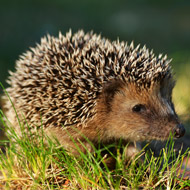Much of England's wildlife still in decline, figures show

Declines have also been seen in 213 of the UK's 2,890 priority species - which includes hedgehogs - for which there is robust data on abundance.
Many of England's best loved wild species are continuing to decline, according to the latest government figures.
An interim report published by Defra shows there were declines in breeding farmland birds, widespread bats and butterflies on farmland and in woodland in 2014.
The report has been produced to track progress following the Natural Environment White Paper, which was published by the coalition government in 2011.
Authors of the report say there has been a significant overall downward trend in butterfly numbers on farmland since 2009. Numbers have fallen by 27 per cent since 1990, reaching a historical low point in 2012.
Butterflies in woodland have suffered a decline of 51 per cent since 1990 - again, reaching an historic low in 2012 - but the underlying trend shows no overall change in the past seven years.
Breeding farmland birds and breeding wetland birds suffered significant declines in the period 2008-2013 - falling by eight per cent and 10 per cent respectively. In 2014, the breeding farmland bird index was 56 per cent lower than in 1970, while breeding wetland bird populations were four per cent fewer compared to 1975, which was the start of the time series.
Declines have also been seen in 213 of the UK's priority species, for which there is robust data on abundance. According to the new figures, by 2012 their numbers had dropped to 33 per cent of the 1970 population. While a quarter of species inclined during this period, the other 75 per cent showed declines.
Nearly half of the 111 priority species for which there are robust distribution estimates became less widespread in the same timeframe, while 22 per cent became more widespread. Overall, distribution of these species fell by 35 per cent in the long term, and remained unchanged in the short term.
By contrast, breeding seabirds have risen by 16 per cent since their 1986 baseline level and the short term change has been negligible.
Breeding woodland birds have seen a slight incline in numbers since falling to their lowest recorded level in 2013, though the population remains 23 per cent lower than the 1970 level. Numbers of wintering water birds showed a short term decrease of five per cent in 2007/8 and 2012/13, but remained higher than the baseline level in 1975/6.
The report will help to inform the government's 25-year plan for the environment, which is now in development.



 FIVP has shared a survey, inviting those working in independent practice to share their views on the CMA's proposed remedies.
FIVP has shared a survey, inviting those working in independent practice to share their views on the CMA's proposed remedies.